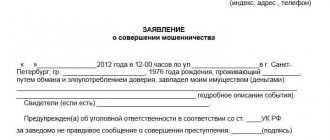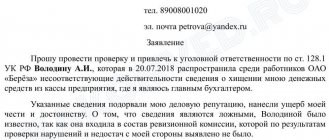There are thousands of fraud schemes in different areas of life in the world. Meanwhile, such actions are a crime (Article 159 of the Criminal Code of the Russian Federation). And if a person has become a victim, then you should write a statement to the police regarding fraud; the form can be downloaded below.
At all times, there are people who, under any pretext, lure money from gullible citizens. They are called scammers. An unpleasant situation can happen in the life of any citizen when his human rights are violated and he needs their protection.
Where to file a fraud report and get justice? This is why law enforcement agencies have been created, such as the police, the Department of Economic Crimes and the Investigative Committee.
statements
There is no standard form for filing a complaint against fraudsters. Below you can download an application template in Word format. When writing it, it is necessary to take into account the signs of a criminal act. You can familiarize yourself in advance with the rules for drawing up statements on the official website of the prosecutor's office. Or, at a meeting with an employee, clarify unclear points and take them into account when drawing up.
This is an example that you can use to fill it out yourself. The form has been compiled taking into account the norms of current legislation. Please note that all information is fictitious.
Can they refuse?
If the circumstances described in the submitted application are qualified as an administrative offense, the police may refuse to initiate a case. In this case, if the defendant is identified and evidence of guilt is collected, the victim can apply to the court to protect his rights and interests.
Russian legislation does not provide for any restrictions on the number of applications, i.e., you can simultaneously file a complaint with all law enforcement agencies.
Those applications that contain information that does not correspond to reality are also subject to refusal to initiate a criminal case.
The concept of fraud and signs of crime
Before contacting the relevant authorities with a statement of fraud, you must make sure that the crime falls into this category of cases. In other words, fraud is the illegal taking of someone else’s property (valuables, money). Fraudsters use simple methods:
- skillfully gain the trust of citizens;
- misleads them.
As a result, citizens do not suspect anything that they have been deceived and voluntarily hand over personal belongings and property.
Only legally capable persons over 16 years of age can be held accountable.
Varieties of crime fall under the disposition of several articles of the Criminal Code of the Russian Federation:
- illegal voluntary transfer of property and other objects due to the gullibility of the victim (Article 159);
- the citizen acted as a borrower at the bank and provided false information about himself (Article 159.3);
- a citizen, when applying to a pension fund, social protection department or other government agencies to receive subsidies, concealed, untimely reported information that affected the amount of the payment and its receipt (Article 159.2);
- in case of seizure of funds from a credit institution using a real or counterfeit bank card (Article 159.3);
- intentional evasion of contractual obligations with enterprises of any form of ownership (Article 159.4);
- fraudulent actions with the object of insurance aimed at obtaining the amount of insurance or increasing its size, for example, some citizens specifically simulate an accident in order to receive an insurance payment from the insurer (Article 159.5);
- the use of electronic technologies, including databases, to take possession of someone else’s property (Article 159.6).
If a citizen fails to independently qualify the crime, the statement can be remembered in any case. In this case, you need to take into account the specifics of the case:
- fraudsters provided information that was not true from the very beginning;
- the real data was entered incorrectly or was not communicated to the recipient at all;
- a person falsified documents and presented them as truthful;
- As a result of the fraudster's actions, the citizen was deceived.
What is fraud
The Criminal Code defines fraud as the taking of property or rights to it through deception or abuse of trust.
Today, separate punishments for this crime exist in the spheres of banking, business and insurance activities.
In addition, certain articles of the Criminal Code provide for liability for fraud in the field of social benefits and computer technology.
From life, there are enough examples of abuse of trust. For example, an acquaintance borrowed money and does not pay it back.
There are many ways to scam people over the phone and on the Internet. Let’s say a person paid money for a product in an online store, but it didn’t arrive. Many elderly people are robbed of their money by swindlers under the guise of social service workers.
Liability for fraudulent actions is aggravated by the amount of damage, as well as the number of persons involved in the crime.
For example, for deception committed by a group, a completely different punishment is provided. In addition, minor (within 1000 rubles) fraud may result in administrative liability.
We recommend! Lawyer in cases of fraud under Art. 159 of the Criminal Code of the Russian Federation, Moscow and Moscow region
Rules for writing an application
The document is drawn up in any form, filled out by the citizen by hand or on a printing device. It is necessary to comply with the basic requirements for drawing up such appeals:
- the test should be easy to understand and consistent;
- Threats and obscene language are not allowed;
- facts and events are listed chronologically (it is advisable to indicate specific dates and location of the incident);
- indicate details and features of the crime that could affect the search for the criminal;
- write down what legal norms were violated (if known).
The prosecutor's office considers anonymous applications. However, based on such appeals, it will be impossible to bring the perpetrators to criminal liability, since there are no actual victims.
Therefore, in the application you must indicate your full name, registration (residence) address and contact telephone number. In addition, the applicant must attach available evidence on the basis of which the fraudster can be held accountable. For example, these could be:
- documents (fictitious contracts, checks, receipts);
- photos;
- audio or video recordings;
- screenshot of correspondence from social networks;
- items transferred by the criminal in exchange for transferred money or valuables.
All attached evidence must be listed at the end of the application. Contents of the complaint Law No. 59-FZ “On the procedure for considering citizens’ appeals” establishes the basic rules for drawing up applications. In Art. 7 lists the basic requirements for written appeals from citizens. Indicated:
- name and address of the prosecutor's office to which the appeal is submitted;
- information about the applicant (full name, passport details, registration address, email and telephone number);
- details and facts of the incident (what happened and when, other points);
- information about the criminal (if available), if there is no information about the identity, then it is necessary to provide any information about his identity in order to speed up the search for the fraudster;
- a request from the victim, for example, to conduct an inspection and return the money;
- signature of the citizen who applied, transcript and date of completion.
The prosecutor's office cannot bring criminals to justice, but this body is authorized to respond to any appeals from citizens. Therefore, after receiving an application, the authority’s employees are obliged to conduct an inspection and send a response to the application within the established time frame.
Everything about criminal cases
Go to list of materials
FSB Order No. 205 of May 16, 2006. N 205
Instructions
“On organizing the reception, registration and verification of reports of crimes and other information about crimes and events that threaten personal and public safety in the federal security service agencies” (as amended on May 16, 2006)
TABLE OF CONTENTS:
| Section I. General provisions Section II. Receiving reports of crimes and other information - clause 7 of Order No. 205 telephone message and going to the scene of the incident — clause 9 of Order No. 205 coupon notification when registering a statement of crime Section III. Registration of crime reports and other information - clause 13 of Order No. 205, book No. 1: for registration of crimes Section IV. Checking received crime reports and other information — clause 25 of Order No. 205 three types of decisions based on the results of verification of allegations of crimes — clause 28 of Order No. 205, the time frame for checking messages is 10 or 30 days |
I). General provisions
1) This Instruction regulates the activities of federal security service bodies in organizing the reception, registration and verification of reports of crimes and other information about crimes and events that threaten personal and public safety.
2) The Instruction applies to the following security agencies and officials in relation to:
— bodies of inquiry.
— investigators.
— interrogators of border authorities.
— employees of the investigative bodies, including regular duty officers, their assistants or employees assigned to duty in the prescribed manner.
3) In the security agencies, the bodies of inquiry include:
FSB of Russia and operational units <*> (including operational units of services) of the FSB of Russia.
<*> In this Instruction, operational units of the FSB of Russia are understood as units that conduct operational accounting matters
.
— directorates (departments) of the FSB of Russia for individual regions and constituent entities of the Russian Federation (territorial security agencies) and subordinate city (district, regional) units.
— directorates (departments) of the FSB of Russia in the Armed Forces, other troops and military formations (security agencies in the troops).
— border authorities and subordinate units carrying out operational investigative activities.
- commanders of military units, formations, heads of military institutions.
4) The following concepts are used in these Instructions:
1) crime report
- a statement of a crime, a confession, a report on the discovery of signs of a crime (procedural and other documents provided for in
Part 2 20 of the Code of Criminal Procedure
and
141 of the Code of Criminal Procedure
-
143 of the Code of Criminal Procedure
:
- statement of the victim or his legal representative in a criminal case of private prosecution
.
- written statement about a crime
, signed by the applicant.
— protocol for accepting an oral statement
about the crime.
- a protocol of an investigative action in which an oral report of another crime is included. minutes of the court session, which includes an oral report of another crime.
- statement of confession
. protocol of confession.
— report
about detection of signs of a crime.
2) other information about crimes and events that threaten personal and public safety - relevant information received by security authorities by telephone, mail, telegraph, fax, e-mail.
3) authorized official - head of the inquiry body
and his deputy, head of the investigative unit and his deputy, investigator, interrogator of border authorities.
4) authorized official - an employee of the inquiry body, to whom the head of the inquiry body or his deputy (taking into account the real need) is entrusted with the exercise of powers to receive reports of crimes, draw up protocols for accepting an oral statement
about a crime and drawing up reports on the detection of signs of a crime in cases and in the manner provided for by
141 of the Code of Criminal Procedure
-
143 of the Code of Criminal Procedure
, as well as checking reports of crimes.
5) verification - actions provided for in 144 Code of Criminal Procedure
and
Part 4 146 of the Code of Criminal Procedure
, carried out by competent and (or) authorized officials upon reporting a crime.
6) reception - a special room in a building in which a security agency is officially located, intended for receiving citizens and appropriately equipped for these purposes.
II). Organizing the reception of reports of crimes and other information
5) The direct organization in security agencies of receiving reports of crimes and other information about crimes and events that threaten personal and public safety is carried out by the heads (chiefs) of these bodies.
6) Reception of reports of crimes and other information about crimes and events that threaten personal and public safety is carried out:
6.1) In FSB units - by authorized and (or) authorized officials, and around the clock - by regular duty officers, their assistants or employees assigned to duty in the prescribed manner. The resolution of organizational issues related to the receipt of reports of crimes and other information about crimes and events that threaten personal and public safety directly from citizens in the FSB is assigned to the FSB Reception Office of the FSB Affairs Directorate.
6.2) In territorial security agencies, security agencies in the military and border agencies - by authorized and (or) authorized officials, and around the clock - by regular duty officers, their assistants or employees assigned to duty in the prescribed manner.
7) If a crime reported by telephone does not require going to the scene, taking measures to prevent or suppress the crime, as well as fixing traces of the crime, then the person who received such information invites the applicant to come to file an application or send an application to mail.
The applicant's refusal to appear or to send a written application by mail does not relieve the person who received such information from the obligation to respond to it.
 Crime reports are received directly from citizens in reception areas.
Crime reports are received directly from citizens in reception areas.
A written statement of a crime must be signed by the complainant.
An oral statement about a crime is entered into a protocol, which is signed by the applicant and the person who accepted the statement. The protocol must contain information about the applicant, as well as documents identifying the applicant.
The applicant is warned by the person who accepted the statement of crime about criminal liability for knowingly false denunciation in accordance with 306 of the Criminal Code
, about which a note is made in the protocol, which is certified by the signature of the applicant.
A statement of confession can be made both in writing and orally ( 142 Code of Criminal Procedure
).
An oral statement is accepted and entered into the protocol in the manner prescribed by Part 3 141 of the Code of Criminal Procedure
.
9) Persons who, in accordance with their authority, have accepted a message about a crime directly from a citizen are required to issue to the applicant, against signature on the spine of the notification, a document confirming the acceptance of this message, indicating information about the person who received it, as well as the date and time of its acceptance.
10) Completed notification counterfoils are handed over by the person who received the message about the crime to the person responsible for maintaining the book of registration of messages about crimes, for reporting and organizing their storage for 1 year from the date of issuing the notification to the applicant.
Url Additional information:
— clause 2 of plenum No. 1
appealing a refusal to accept a crime report
11) The following are posted on stands in the reception areas: extracts from the provisions of the Code of Criminal Procedure, interdepartmental and (or) departmental regulations governing the procedure for receiving reports of crimes. samples of a written statement about a crime, a statement of confession
and requirements for their preparation, as well as business telephone numbers and addresses of officials to whom actions related to the acceptance or refusal to accept reports of crimes can be appealed.
12) Reception of other information about crimes and events that threaten personal and public safety received by security agencies is carried out in accordance with the established rules of office work. The accepted information is reported immediately to the relevant manager (supervisor), who, depending on its content, gives written instructions on registration and the verification procedure. If other information about crimes and events that threaten personal and public safety was received in writing, then the corresponding resolution is usually imposed directly on the received document.
III). Organization of registration of reports of crimes and other information
13) To register and record reports of crimes received by the security authorities, Book No. 1 is created
The person who has received a report of a crime reports this upon command to the relevant manager (supervisor) and, on his instructions, takes measures to immediately register the received report of a crime in Book No. 1.
Circumstances requiring an urgent response are reported to the specified manager (supervisor) immediately.
Reports of crimes committed in military units and formations, military institutions ( clause 4, part 2, 157 of the Code of Criminal Procedure
), are registered in Book No. 1, established in these units and institutions.
If there are reasons preventing an official from immediately submitting a report of a crime for registration (for example, due to a significant distance from the place of registration, natural disaster, bad weather, etc.), registration of such a report in Book No. 1 can be carried out on the basis of information , transmitted (received) via various communication channels.
14) Reports of crimes received by security agencies under jurisdiction are registered in accordance with the requirements of these Instructions.
15) Reports of crimes sent according to jurisdiction, taking into account territoriality, to another security agency are re-registered at the place of receipt.
16) To register and record other information about crimes and events that threaten personal and public safety, requiring verification and prompt response, received by the security authorities, Book No. 2 is created.
17) Book No. 1 and Book No. 2 are maintained in the bodies of inquiry, the Investigative Directorate of the FSB and, if necessary, in the investigative units of the security agencies.
The sheets of these books must be numbered, stitched, the ends of the threads are sealed with paper stickers with the stamp “For packages”, glued with silicate glue.
18) Employees responsible for maintaining Book No. 1
and Book No.
2
, are appointed by orders of the relevant managers (chiefs) vested with the right to issue orders on personnel.
19) Received reports of crimes and other information about crimes and events that threaten personal and public safety are registered in the appropriate books under the next serial number.
A registration stamp is affixed to the front side (in a text-free space) of a crime report or other information about crimes and events that threaten personal and public safety, submitted in writing.
20) Book No. 1 is stored for at least 3 years from the date of registration of the last report of a crime in it.
It is prohibited to reflect in Book No. 1 information that has become known about the private life of the applicant (victim), his personal and family secrets, as well as other confidential information protected by law.
IV). Organization of verification of reports of crimes and other information
21) Each accepted and registered in Book No. 1
and Book No.
2
, a message about a crime and other information about crimes and events that threaten personal and public safety are reported upon command to the relevant manager (supervisor), who gives instructions on the verification procedure, including the adoption of urgent measures.
Circumstances requiring an urgent response are reported to the specified manager (supervisor) immediately.
22) The adoption of urgent measures is organized by the staff on duty of the relevant security agencies in the manner prescribed by the regulatory legal acts of the FSB, as well as interdepartmental regulatory legal acts.
23) Verification of received reports of crimes is carried out by authorized officials, interrogators of border authorities, and investigators.
24) The procedure and timing of verification of other information about crimes and events that threaten personal and public safety are determined in accordance with the regulatory legal acts of the FSB regulating the procedure and timing of conducting operational accounting files
.
Anonymous reports of crimes are registered in the Book № 2
, if necessary, are checked by operational units of security agencies.
If, based on the results of consideration of other information about a crime and event that threatens personal and public safety, a report on the discovery of signs of a crime, the inquiry and preliminary investigation of which is assigned to the jurisdiction of the security authorities, it is sent to the inquiry body, the interrogator of the border authority or the investigator, and is registered and is checked in accordance with the established procedure.
Reports on the detection of signs of a crime, the preliminary investigation of which does not fall under the jurisdiction of the security authorities, are sent according to jurisdiction.
Notes on the results of verification and consideration of other information about crimes and events that threaten personal and public safety, including anonymous statements, are made in the Book № 2
)
25) Based on the results of checking the received and registered report of a crime in accordance with Part 1 145 of the Code of Criminal Procedure
a competent or authorized official, within his competence, makes one of the following decisions:
- on initiating a criminal case in the manner established by 146 Code of Criminal Procedure
.
- refusal to initiate criminal proceedings.
— on the transmission of a report of a crime under jurisdiction in accordance with 151 of the Code of Criminal Procedure
, and in criminal cases of private prosecution - to court in accordance with
Part 2 20 of the Code of Criminal Procedure
.
The applicant is informed about the decision made, his right to appeal the decision and the procedure for appealing in accordance with criminal procedure legislation are explained.
The results of verification and consideration of reports of crimes are noted in the Book № 1
.
26) If, based on a received report of a crime, separate investigative actions were carried out to consolidate traces of the crime and identify the person who committed it, then the relevant protocols and resolutions are attached, respectively, to the resolution to initiate a criminal case, the resolution to refuse to initiate a criminal case, or the materials sent according to jurisdiction.
27) In the event of a decision to transfer a message under jurisdiction or a decision to transfer a message to the court, the first copy of the above decision together with a report of a crime and, if available, with other documents, including the discovery and seizure of traces of a crime and other evidence , must be sent within 24 hours according to jurisdiction or jurisdiction, the second copy of the resolution must be sent to the applicant, and the third copy with a copy of the message must be added to the nomenclature file of the security agency.
For reports of crimes that require an urgent response, the information contained in the message or a resolution with this message must first be transmitted to the appropriate investigative body through emergency communication channels.
Information about the sending of these reports of crimes by jurisdiction or jurisdiction is registered in accordance with the rules of office work established by the security agencies, about which a subsequent note is made in the Book № 1
)
28) Time limits for checking reports of crimes provided for by 144 Code of Criminal Procedure
and
146 of the Criminal Procedure Code
, are calculated from the date of receipt of the first report of the specified crime, with the exception of reports of crimes transferred, taking into account territoriality, to another body under jurisdiction, the verification period for which is determined from the date of their receipt under jurisdiction, and for reports of crimes committed or being prepared, received from other sources - from the date of registration
of the report
on the discovery of signs of a crime, if this report was not sent, taking into account territoriality, to another body with jurisdiction.
29) Accepted, recorded and verified crime reports, Books № 1
, notification counterfoils, inspection materials and decisions made based on the results of consideration of these messages are presented to prosecutors, as well as judges and other officials in cases provided for by federal laws and regulations of the FSB.
30) Materials from checking reports of crimes for which decisions were made to refuse to initiate criminal proceedings are formed into independent files and stored for 5 years in the security agencies (operational units) that carried out their verification.
Return to the list of materials
Seek advice
How to apply
There are several ways to submit the form:
| Way | Description |
| Personally | The citizen fills out an application at home and submits it through the prosecutor's office. You need to have two forms with you, one is handed over to the institution, and on the second the office worker must put an acceptance mark. If you have only one form with you, you can ask them to make a copy of the application, where the employee of the institution put a mark on the date of admission. |
| By mail | Documents are sent by registered mail with notification. In addition, if evidence is attached to the appeal, it is better to make an inventory listing the attachments. |
| Electronically | The application is sent in a special section, scanned copies of the evidence base are attached. After receiving the request, a delivery notification should be sent to the applicant's email address. |
The period for consideration of the application does not depend on the method by which the citizen submits the application to the prosecutor's office. You must have evidence confirming the fact of receipt by the supervisory authority.
In Art. 5 of Order No. 45 of the Prosecutor General’s Office establishes the following rules for sending a response:
- a standard period for responding to an appeal has been determined - 30 days;
- if the application does not require additional checks, it must be done within 15 days;
- if it is necessary to clarify the information, the period for consideration of the complaint can be extended, but not more than 30 days (prosecutor’s office employees are required to notify the applicant about this and list the measures taken)
If a citizen cannot independently draw up a statement to the prosecutor’s office against the actions of fraudsters, he can seek the help of lawyers. This will only speed up the filing of the complaint, which will give a chance for a speedy consideration of the issue.
Electronic
Submitting an application to the prosecutor's office via the Internet is considered more convenient. Since you do not need to adapt to the operating hours of the institution, the application can be sent at any time of the day. In addition, some senders have doubts about the reliability of sending letters by mail. Moreover, when submitting an application through the official website of the Prosecutor General's Office, you receive a notification that the application has been processed. The application must indicate the citizen’s personal data and the email address to which the response will be sent.
If during the prosecutor's investigation it is established that the applicant provided false information, while he knew that the information was unreliable, such a person will be held accountable for false denunciation. For this purpose, when receiving statements about crimes, a receipt is immediately taken from citizens. It explains that the applicant is aware of the consequences of a false denunciation.
In 2021, the format of electronic applications to the prosecutor's office will be simplified. A super service will be introduced on the government services portal, allowing you to submit a single statement about criminal offenses to the Ministry of Internal Affairs and the prosecutor's office. Consequently, there will be no need to duplicate appeals or wait for response measures from the prosecutor’s office specialists.
How to correctly write a statement to the police about the fraudulent actions of an attacker
As such, this document does not have a strictly defined form. Therefore, a statement from the investigative committee about fraud, a sample of which is given below, may be useful.
So, the report of a crime to the Department of Internal Affairs for fraud should begin with the indication of the police department and the details of the applicant.
After this there is a request to bring the guilty person to justice under the relevant article of the criminal code.
Next, in your own words, you should write the circumstances under which the crime occurred, and also indicate the amount of damage caused.
We recommend! Classification of complicity in a criminal act
The application should be accompanied by evidence of the offense committed (copies of checks, receipts). The police will base their investigation on them. At the end of the application, you must remember to put the date and your personal signature with the initials deciphered.
What to do if the prosecutor's office refuses to consider the application
As with other government departments, an application to the prosecutor's office about fraud may be rejected. It is usually caused by the inability to determine the identity of a potential criminal, lack of evidence of illegal actions. Such facts will be indicated in the refusal letter, and the prosecutor’s office will receive them from the materials of the pre-investigation check of the Ministry of Internal Affairs. All conclusions indicated in the response must be reasoned and supported by references to the results of inspections.
Cases involving fraud are initially difficult to solve. Therefore, in a refusal of an application, it may be proposed to file a claim in court, demand the recovery of money or the return of property under civil law. If you disagree with the prosecutor's conclusions, you can file a complaint in the order of subordination. If such an appeal does not bring results, you can file an administrative complaint in court.
Internet fraud - how to get your money back
Unfortunately, it is almost impossible to recover money lost as a result of fraudulent activities on the Internet. Most often, scammers have minimal computer and legal literacy skills and accept money not to a bank card, but to an account that does not require identification confirmation (for example, to a wallet opened in the Payeer system), which complicates the procedure for finding them.
It will also not be possible to contact the scammer on your own and appeal to his conscience. Usually the telephone numbers indicated in the advertisements do not answer, and the copies of documents and information about the registration address provided are fake.
Contacting law enforcement agencies may give you a slim chance of getting your money back. How to do this is described below.










